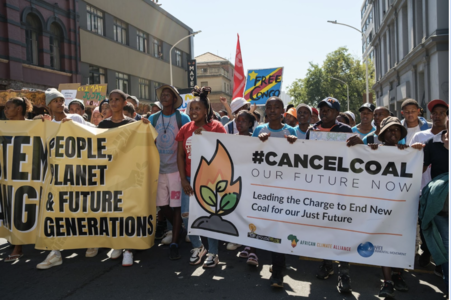Petition is successful with 854 signatures
To: Minister of Mineral Resources and Energy and NERSA
[VICTORY]Tell the Government to End New Coal and Invest in Renewable Energy for a Brighter Future
On 4 December 2024, we received the news that we had won the court case! In a landmark ruling, the High Court of South Africa has overturned the government’s plans to add 1,500 MW of new coal-fired power to the national grid, saying they are "unlawful and invalid".
Read more on the court case here: https://www.africanclimatealliance.org/blog/court-says-governments-plans-for-new-coal-fired-power-stations-are-unconstitutional

* [Campaign Update]: After three years of litigation, the landmark Cancel Coal case was heard in Pretoria High Court on 9 and 10 October.
The argument in court centred around the failure of the state respondents to ensure adequate consultation with youth, children and representatives of future generations. Due to the intensifying nature of the climate crisis, unchecked climate change will impact most heavily on children whose lives are still ahead of them. Additionally, it is children, (along with elderly people and those with respiratory health conditions) who are the most vulnerable to the toxic air pollution emitted by coal fired power plants.
Read more here: https://www.dailymaverick.co.za/article/2024-10-10-not-without-a-fight-young-activists-take-mantashe-nersa-to-high-court-over-new-coal-power-plans/
** [Campaign update]: On 4 December 2024, we received the news that we had won the court case! In a landmark ruling, the High Court of South Africa has overturned the government’s plans to add 1,500 MW of new coal-fired power to the national grid, saying they are “unlawful and invalid. Read more on the court case here: https://www.africanclimatealliance.org/blog/court-says-governments-plans-for-new-coal-fired-power-stations-are-unconstitutional
** [Campaign update]: On 4 December 2024, we received the news that we had won the court case! In a landmark ruling, the High Court of South Africa has overturned the government’s plans to add 1,500 MW of new coal-fired power to the national grid, saying they are “unlawful and invalid. Read more on the court case here: https://www.africanclimatealliance.org/blog/court-says-governments-plans-for-new-coal-fired-power-stations-are-unconstitutional
South Africa’s electricity minister has said that South Africa will not see any new coal power plants. But the government has not yet withdrawn a 2019 determination that aims to bring on 1500 MW of new coal – the equivalent of three to four large power plants.
Sign this petition to call on the government to close the door on new coal by withdrawing the 2019 determination. Instead, we need a focus on building a renewable energy economy that will mean reduced energy costs, healthier communities and electricity for those who need it and still don’t have it.
Why is this important?
- Building new coal plants will take years and be very expensive to build and maintain. This will drive up the cost of electricity for everyone even more.
- Renewable energy projects are cheaper, more sustainable and can be deployed quickly to meet our immediate electricity needs, while bringing electricity to communities who most need it.
- Those who live on the coal front are already suffering extreme health problems because of poor air quality around coal plants. Air pollution from coal-fired power stations kills more than 2,200 South Africans every year and causes thousands of cases of bronchitis and asthma in adults and children annually.
- People who work coal jobs are increasingly under threat of retrenchments and are also forced to work in very unhealthy environments. Future renewable energy and other green economy jobs can create even more opportunities for workers than future coal jobs – if planned carefully.
- Coal is a major contributor to climate change, driving extreme weather events that threaten our way of life. We have a responsibility to current and future generations to reduce emissions and embrace sustainable energy solutions.
Sign on to Tell the Government to End New Coal for our Just Future !
About the Campaign!
The #CancelCoal campaign is a youth-led campaign by the African Climate Alliance, Vukani Environmental Movement, and groundWork. It calls for the end of new coal in South Africa and supports the landmark legal case of the same name, represented by the Centre for Environmental Rights.
The legal case is a constitutional challenge to the South African government’s plans to introduce 1500 MW of new coal-fired power electricity - the equivalent of three to four large power plants. We are asking the court to put a stop to the government’s call for the development of this new coal capacity.
.png)

